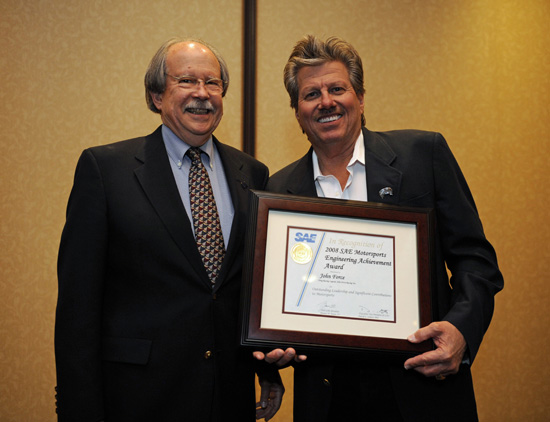SAFETY ADVOCATE DR. JOHN MELVIN PASSES AWAY
 The drag-racing world met Dr. John Melvin in 2007, in the most heartbreaking of circumstances.
The drag-racing world met Dr. John Melvin in 2007, in the most heartbreaking of circumstances.
But it embraced him for his knowledge that heartened spirits – that driver protection indeed is possible, that folks are diligently at work to ensure that fatal accidents such as Eric Medlen’s don’t happen again.
 The drag-racing world met Dr. John Melvin in 2007, in the most heartbreaking of circumstances.
The drag-racing world met Dr. John Melvin in 2007, in the most heartbreaking of circumstances.
But it embraced him for his knowledge that heartened spirits – that driver protection indeed is possible, that folks are diligently at work to ensure that fatal accidents such as Eric Medlen’s don’t happen again.
Melvin, the automotive-safety expert and biomechanical engineer who passed away July 17 at Ann Arbor, Mich., was remembered in an Aug. 10 memorial service.
“He leaves behind an outstanding legacy of safety improvements that has benefited the automobile racing world, believed to be unmatched,” Stand 21 founder Yves Morizot and spokesman Abder Amokrane said in a joint statement. The pair worked with Melvin, a board member of the company’s Racing Goes Safer foundation.
“His training in biomechanical engineering gave him a unique perspective to study the causes of human-body injuries in racing crashes and devise solutions to minimize such injuries,” they said. “Many drivers today credit these improvements for saving their lives. The racing community has lost a friend, a mentor, a towering giant. No eulogy can accurately credit John for his extraordinary body of work.”
Both John Force and John Medlen collaborated with Melvin in investigating Eric Medlen’s accident at Gainesville, Fla., and beyond as The Eric Medlen Project was established. Both said they were “very sorry to hear that news. It was a huge loss for everyone.”
Melvin was a research manager for Ford, General Motors, and Dodge Racing safety programs before becoming a consultant regarding the biomechanics of impact injury and their application to the protection of vehicle occupants in crashes.
“My approach to racing safety is I advise manufacturers, I advise manufacturers, I advise racers, and I advise sanctioning bodies,” Melvin said at one of the many seminars in which he participated.
“What we’re talking about is not trying to sell a product but to sell a concept of how to protect yourself, he said. “Every racer needs this information.
“Racing, 25 years ago, everybody knew it was dangerous. And if you got hurt, that was just the way it goes. When I was a kid, back in the ’50s, I would read in the Monday newspaper how many drivers died that weekend in racing in the United States. It was just common and accepted. Today’s modern society does not accept a sport that kills its heroes,” Melvin said. “Our research has shown the cars are quite protective if you have the right equipment. It’s just unacceptable to have people dying preventable deaths.”
Melvin was 76.
The act of cutting and pasting articles from this publication to a message board is a clear copyright violation as is pulling photos to post on social media sites. All articles and photography published in CompetitionPlus.com are protected by United States of America and International copyright laws unless mentioned otherwise. The content on this website is intended for the private use of the reader and may not be published or reposted in any form without the prior written consent of CompetitionPlus.com.





































